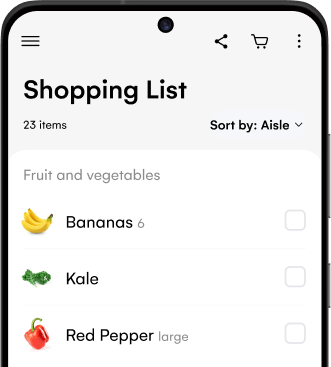Estimated reading time: 6 minutes
Losing weight is a challenging but popular goal. Whether it’s for health reasons, to change your appearance or fit into that dream outfit, you may be wondering if you can lose weight through diet alone. Or do you need to hit the gym too?
Weight loss is a byproduct of many complex factors which include your genes, sex, hormones, metabolic rate, physical activity levels and diet. But of course, it does come down to whether you’re burning more calories than you’re consuming.
Analyse nutritional information for any recipe

Diet is just one piece of the puzzle. And while it’s an important piece, you need to consider all the factors if you want your weight loss to be safe and sustainable.
Here’s what you need to know about whether you can lose weight through diet only, and whether it’s good for you to do so.

Can you lose weight just by changing your diet?
The short answer is yes.
If you change your diet, without changing anything else, you can lose weight.
One of the things that keep your weight stable is how many calories you are able to consume. Your body needs calories for all the work it does. For example, breathing, circulating your blood, and keeping your organs alive. And it also needs energy for all the movements you make.
That means your body needs to use energy every day to keep you alive. If your food contains enough energy to meet your daily needs, then your weight will remain the same.
If your food contains less energy than you need, then your body will burn your existing body fat or even muscle to meet the demand.
That means, if you consistently eat less than you require over time, you will lose weight. In technical terms, it’s called creating a calorie deficit. And it does work. But there’s a catch.
Why using diet alone to lose weight isn’t a good idea.
You can lose weight just by changing your diet. But most doctors recommend a balanced approach where you also include exercise and other health changes (e.g. limiting alcohol or stopping smoking). Why is this?
If you just limit calories, you might notice some changes in your body and overall health which could impact your weight management journey negatively over time.
Let’s look at what some of those changes are, and why they’re important.
Install free Chrome extension for easy recipe saving

Increased appetite
When you reduce the amount of food you eat, your appetite is likely to increase. And when you feel hungry all the time, you will be tempted to eat more than you were eating before. Or to enter into cycles of binge eating.
Of course, not everyone who watches their caloric intake will do this, and there are plenty of ways to eat low calorie foods which still fill you up, practice mindful eating, use intuitive eating, or simply adhere to a more sustainable diet. But if you’re crash dieting or depriving yourself, you might end up struggling more than you imagine.
Muscle loss
When you don’t eat enough, your body needs to burn energy from your body, along with fat. If you’re not providing adequate fuel for everyday processes, you may find your body is losing and using your muscles too.
This can lead to a marked reduction in your muscle mass over time. You may lose weight, but it would be at the cost of lean muscle. Over time, this could cause issues. Other than lack of strength and tone/definition in muscles, you may suffer from weakness, walking difficulties and increased risk of other conditions as you grow older. That’s why strength training is so beneficial to your health.
Slower metabolism
Your body treats a sudden reduction in food as a famine. Basically, it goes into ‘emergency’ mode and tries to hold onto any reserves of fat and energy. This begins to slow your metabolism. Without any exercise to keep your metabolism high, your body will gradually make it harder to lose weight even when you are eating fewer calories than before.
Research shows that when people attempt to lose weight by diet only, they tend to plateau after they lose about 5kg – 8kg or about 5- 9 % of their starting body weight.
Less energy
If you reduce your meals and your caloric intake, you may find that you have essential energy for your daily tasks and this can lead to you doing less.
Eventually, you may find that even though you eat less, you are doing far less than usual. And in the end, you aren’t using any of your energy stores or losing weight. Why? Because you’re burning less calories through day-to-day activities than you were previously.
It’s important to eat enough calories, even if you’re aiming to lose weight. Drastically cutting them is not only unsustainable, but also dangerous.

Higher risk of some conditions
Attempting to lose weight through diet alone can increase your risk of certain conditions, notably vitamin deficiencies and stomach ulcers. Losing weight through diet alone can lead to a limited diet where you don’t get all the vitamins and minerals you need in the diet. Also, going without food for long periods of time has been linked with loss of the protective lining of your stomach and a greater number of stomach ulcers.
Losing weight through diet changes alone
So, it’s possible to lose weight just by changing your diet, but this will be harder than if you combine physical activity, sleep, and other wellness efforts.
Diet is a major part of your weight, and choosing to eat better, plan your meals, and eat a wider variety of vitamins and minerals will certainly help your weight management journey. It’s one of the main reasons people choose Samsung Food to help them stay on track with their health goals. You can download Samsung Food app here if you’d like to see how it can help you lose weight too.
But diet alone isn’t an ideal approach. Making drastic changes to what, how much, and how often you eat can make your body hold to weight and not lose it.
The best approach is to work at losing weight by changing any and every thing that affects it. An added benefit is you’ll probably feel stronger, more energized, and generally more well if you tackle all of these factors too.


